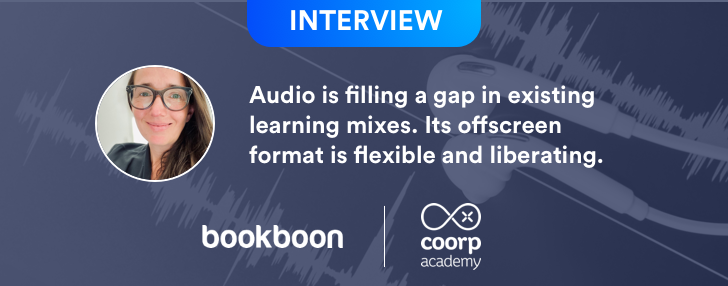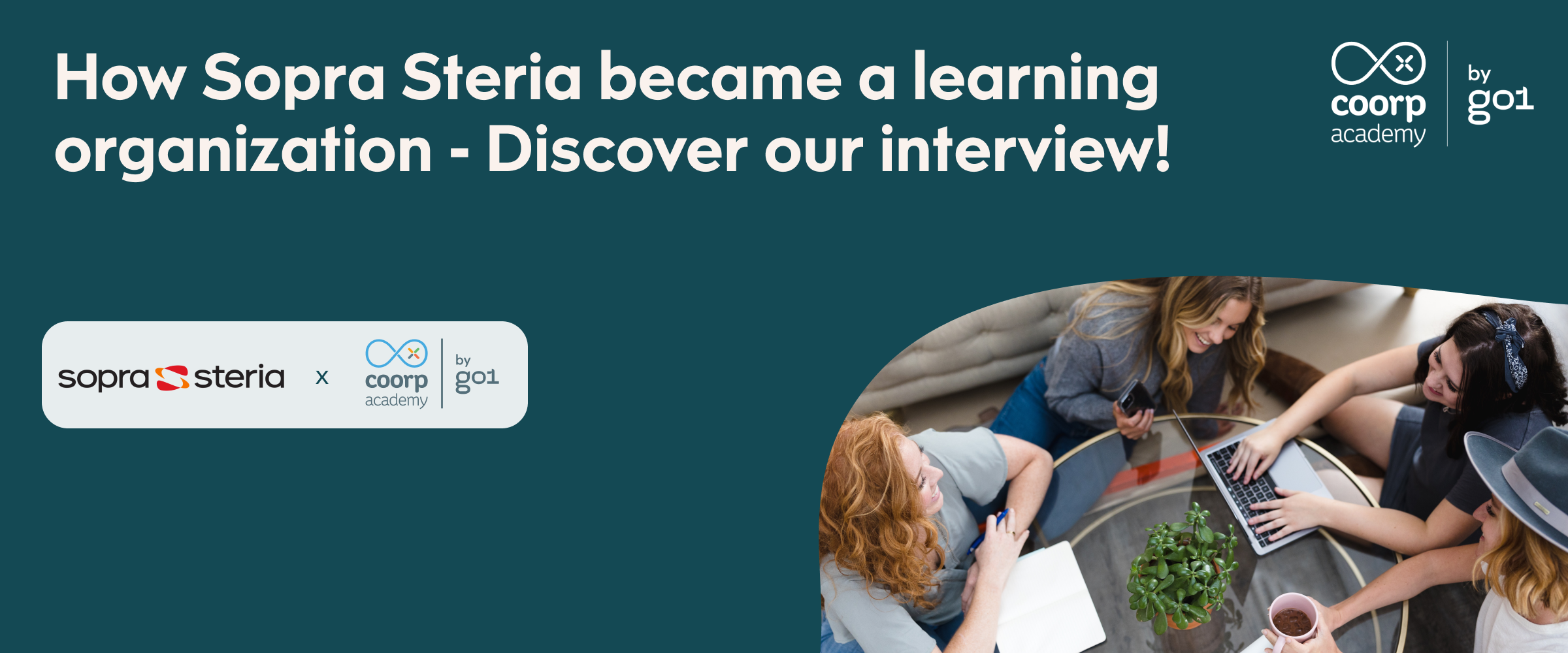What makes audiolearning an effective learning tool!
Interview

Coorpacademy has partnered with Bookboon, the world‘s leading publisher of ebooks and audio learning for professionals. A new way of consuming online content has recently taken off: podcasts. Audio content, avoiding the fatigue of the screen that has become omnipresent, is experiencing an unprecedented boom and its use is becoming part of everyone’s daily life. That’s why audio formats are now to be part of digital learning catalogues and offers!
Sylvia Koenig, Digital Learning Director at Bookboon, has answered our questions giving us more details about Bookboon and diving into audiolearning specifics and benefits!
Q. Can you give us a quick introduction to Bookboon Learning?
Bookboon Learning is often referred to by clients as “the Netflix of corporate learning”, which is due to our high focus on User Experience and Simplicity.

Our content focus is to develop highly relevant and easy to digest content on soft skills and personal efficiency. With our bite size eBooks and Audio Learning items, we provide focused learning experiences from 10 minutes to 1,5 hours. This is short enough to finish in a single sitting, while still delivering the amount of knowledge needed to fully develop a new skill.
With currently thousands of titles, we constantly update and expand our catalogue, so our learners can discover new
Q. How do you design your audio content and ebooks? What is the validation process and how do you recruit the experts?
We are a digital and AI driven learning company. When it comes to developing our content, Bookboon Learning operates similar to traditional publishing house with an experienced team of editors and a global network of renown authors. Our content is written and produced exclusively for Bookboon Learning. We breathe knowledge and understand ourselves as thought leaders guiding the industry.
The Bookboon Learning editorial team is well connected with experts across the world. They recruit authors by relevance and authority for a specific topic. There are also authors approaching us as they know our reputation and reach. All our authors are leading experts in their fields, like e.g., Nick Van Damm, the former CLO of McKinsey. He writes for example on the future of Learning & Development or on How to stay relevant in the job market.
Each editor works closely with the author for the best result – from a learning impact and a design perspective. Everything needs to be short and precise to the point: Read or listen today, use it tomorrow.
Q. What makes audio learning an effective learning tool?
From our personal experiences and the feedback from our clients, Audio is filling a gap in existing learning mixes. Its offscreen format is flexible and liberating. Audio allows people learning on top of doing something else, even while walking the dog or driving a car. This makes it perfect for busy schedules – it just saves time.
Because of its informal aspects, audio doesn’t feel like learning. The motivation is higher compared to traditional learning tools.
Peoples’ screen time has dramatically increased during lockdowns. They value a variation in learning formats with more flexibility for time and place of their learning sessions.
Another fact that is often overlooked:
More than 30% of the population are auditory learners, learning best through hearing. This is big group of people where audio can make a difference.
Audio learning checks many boxes of a contemporary and effective learning tool and should be part of every modern learning offer.

Q. How does knowledge anchoring work with audio learning versus traditional learning?
Audio is perfect to grasp a concept in a short time. The learner gets the framework and recommendations. And is ready to use it immediately for his or her purpose. eBooks deliver more complex and detailed information in a digestible way. Reading is faster than listening, compensating the usually bigger scope of an eBook.
In terms of perception, science suggests that audio learning is comparable to reading. As a study from the researchers of Gallant Lab at UC Berkeley published in the Journal of Neuroscience concluded, it does not make a difference for the brain if the word is spoken or read. A study from the University of California by Matthew Traxler comes to a similar conclusion. You can choose the format that suits you best.
Q. What is your vision of the evolution of corporate training in the next 5 years?
The vision of Bookboon Learning for the future of learning is focused on simplicity. As the world continues to grow ever more complex, all our data points in the direction of even-further increasing simplicity.
There is a very interesting annual simplicity study by global brand strategy firm Siegel+Gale, defining simplicity as a strong driver for brand loyalty. Consumers prefer a seamless, simpler, and faster brand engagement, as this saves one very important thing: Time. From our experience, you can easily transfer these finding to learners. Instead of overwhelming them with complex experiences, simplicity of content and learning paths will always pay back in highly appreciated timely efficiency, leading to higher motivation and steady recurrence – both fundamental requirements of successful learning programs.
Q. What have you observed in the world of training during the Covid-19 crisis?
A year ago, there still where discussions about the relevance and impact of online learning.
Due to the worldwide COVID restrictions, digital learning is not just an option anymore, it’s a necessity now.
People had to dramatically adjust to new scenarios in a very short period. Remote Working, Virtual meetings, Working from Home, Homeschooling. All these new skills don’t come naturally, they must be learned, reflected, and adapted for the own personal situation. Digital learning can be done while life happens, while questions occur – it’s real time. It has proved its strengths and is the perfect companion to thriving these days.
More info:
Audio learning is the way to go: a new exclusive partnership between Coorpacademy and Bookboon

